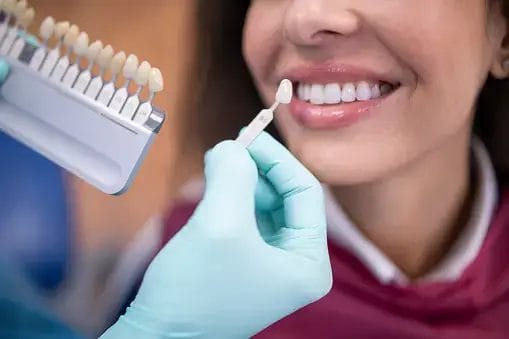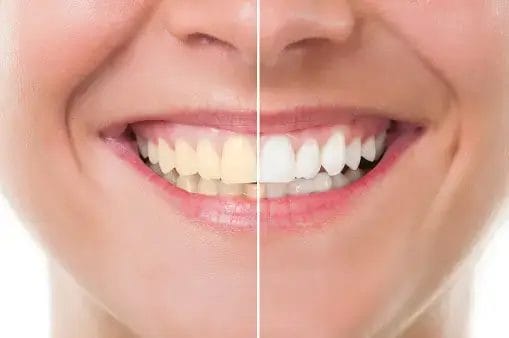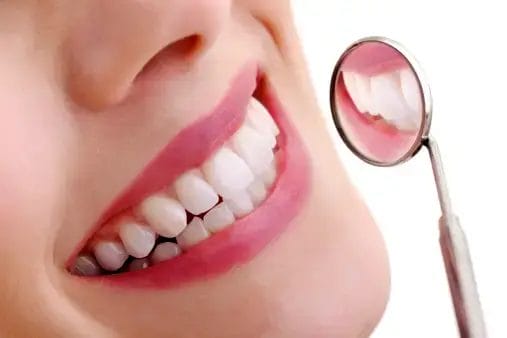Teeth Whitening
All Services

It's crucial to note that not everyone is a candidate for teeth whitening, and the procedure may not be recommended for individuals with certain dental conditions. Always consult with a dental professional to determine the best approach for achieving a whiter and brighter smile based on your specific circumstances.
Why Us
It seems like your question might be truncated or incomplete. If you’re asking why someone might choose to undergo teeth whitening, here are some common reasons:
-
Enhanced Aesthetics: The most obvious reason people choose teeth whitening is to improve the appearance of their smile. Whiter teeth can make you look younger and more attractive, boosting your confidence and self-esteem.
-
Stain Removal: Teeth can become stained or discolored over time due to various factors, including consumption of coffee, tea, red wine, tobacco use, and certain medications. Teeth whitening helps remove these stains and restore the natural color of the teeth.
-
Special Occasions: Some individuals opt for teeth whitening before special occasions such as weddings, reunions, or job interviews to ensure a bright and confident smile in photographs or social interactions.
-
Job or Career Requirements: In certain professions where appearance plays a significant role, individuals may choose teeth whitening to maintain a polished and professional look.
-
Boosted Self-Confidence: A brighter smile can positively impact self-confidence. Feeling good about the appearance of your teeth may encourage you to smile more often and engage confidently in social and professional situations.
-
Quick Results: Teeth whitening, especially in-office professional treatments, can provide relatively quick results compared to other cosmetic dental procedures.
-
Non-Invasive Procedure: Teeth whitening is a non-invasive cosmetic dental procedure that doesn’t require surgery or the removal of tooth structure. It’s a relatively simple way to enhance your smile.
-
Customized Options: There are various teeth whitening options available, ranging from over-the-counter products to professional treatments. This allows individuals to choose an option that aligns with their preferences, budget, and desired level of whitening.
It’s important to note that while teeth whitening can be an effective and safe cosmetic procedure for many people, it may not be suitable for everyone. It’s recommended to consult with a dentist before undergoing any teeth whitening treatment. A dentist can assess your oral health, identify the cause of discoloration, and recommend the most appropriate whitening method for your individual needs. Additionally, they can provide guidance on maintaining oral hygiene and preventing future staining.
Teeth Whitening FAQ
What is teeth whitening?
In general, it is recommended to have a professional teeth cleaning every six months. However, the frequency may vary based on individual oral health needs. Your dentist or dental hygienist will provide guidance on the ideal schedule for your specific situation.
Why do teeth become discolored?
Teeth cleaning is typically not painful. During the cleaning, you may feel some pressure and scraping as the dental professional removes plaque and tartar. If you experience discomfort, it’s essential to communicate with the dental team, as they can make adjustments to ensure your comfort.
How does teeth whitening work?
It’s generally recommended not to eat a heavy meal before a dental cleaning, as the process involves various tools and instruments in your mouth. However, having a light meal should not pose a problem. Drinking water is usually fine.
Are there different methods of teeth whitening?
The duration of a teeth cleaning appointment can vary depending on factors such as the extent of plaque and tartar buildup, the thoroughness of the cleaning, and any additional treatments needed. On average, a routine cleaning appointment may take 30 minutes to an hour.
Is teeth whitening safe?
X-rays are not always taken during a routine cleaning, but your dentist may recommend them periodically to assess the health of your teeth and identify any issues not visible during the clinical examination.
How long does teeth whitening last?
Professional teeth cleaning can help remove surface stains from your teeth through the polishing process. However, for deeper stains, additional whitening treatments may be recommended.
Can anyone undergo teeth whitening?
Many dental insurance plans cover routine teeth cleaning as a preventive measure. However, coverage may vary, so it’s essential to check with your insurance provider to understand the details of your plan.
Does teeth whitening work on all types of stains?
It’s a good practice to maintain your regular oral hygiene routine, but avoid aggressive brushing right before your appointment, as it may cause gum irritation. Your dental professional can better assess your oral health if you’ve maintained your usual routine.
Can pregnant or breastfeeding women undergo teeth whitening?
To maintain good oral hygiene, brush your teeth twice a day, floss daily, use an antiseptic mouthwash if recommended by your dentist, and follow a balanced diet low in sugary foods and drinks.




